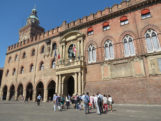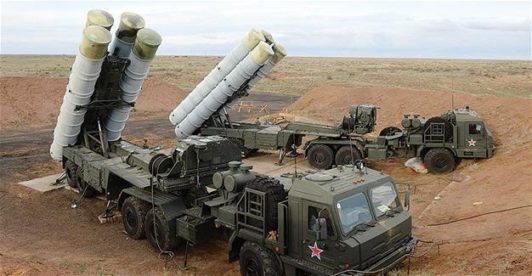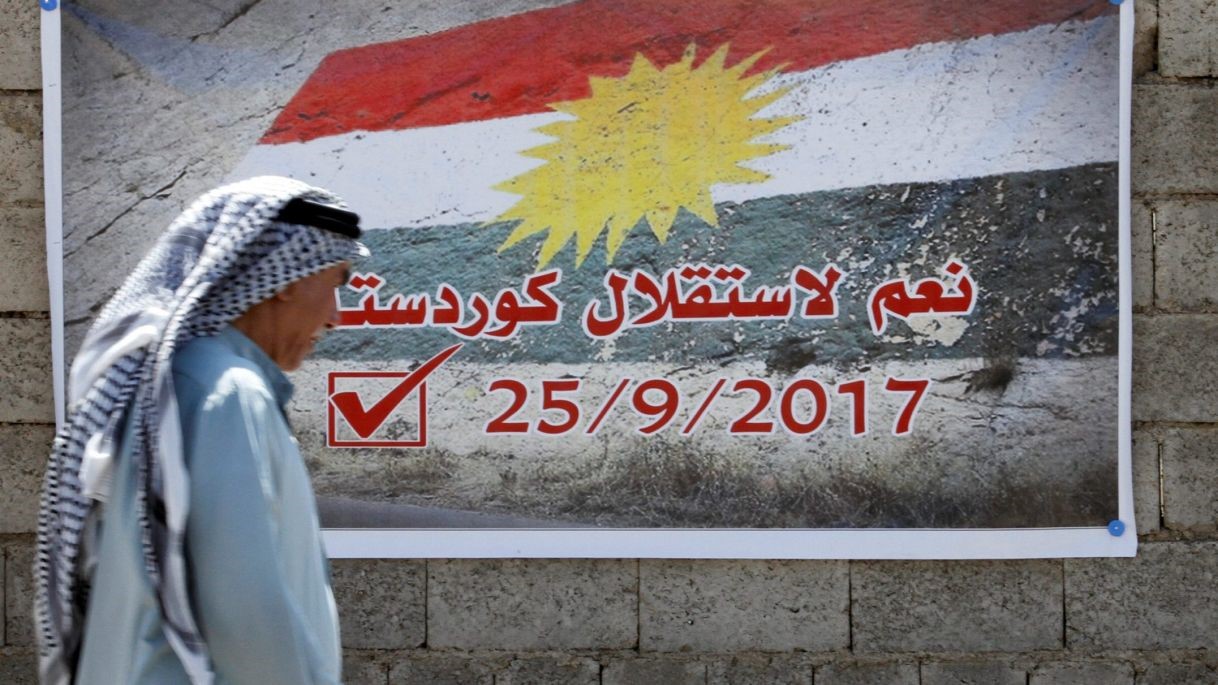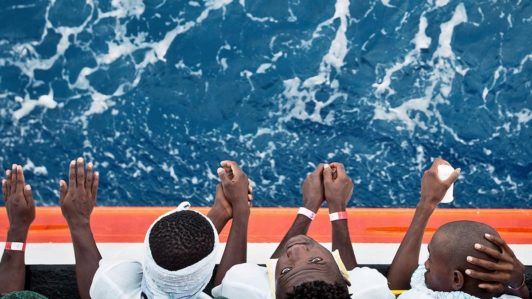|
| |
This week in: Peace & Security Publications |
IPSI | Africa | Americas | East Asia | Middle East | South Asia
|
|
|
|
| |
This week in Peace & Security Publications
|
|
|
|
| |

Amnesty International: This document focuses on the Peruvian State’s duty to respect, protect and fulfil Indigenous Peoples’ right to health, including its obligation to provide an appropriate response to communities that are faced with contamination by and exposure to heavy metals. This document does…
|
|

Amnesty International: This report delves deeper, documenting the cases of 101 individuals who, between March 2013 and March 2017, were held incommunicado, tortured, and sometimes killed by Cameroonian security forces in facilities run by the military and intelligence services. Despite such practices being in violation of…
|

HRW: This report tracks donors’ fulfillment of their pledges to support education for Syrian refugees in 2016. It focuses on pledges made at a major conference in February 2016 in London, where donors—the six largest were the…
|
|
|
|
|
|
| |

Sarajevo Blogs! Experience the Sarajevo Symposium on Post-Conflict Transitions through the eyes of the participants in their daily blog!
|

Bologna Blogs! Learn more about Bologna Symposium by reading our blog written by participants from this summer!
|
|
|
|
|
|
| |
This week in Sub-Saharan Africa
|
|
|
|
| |
CENTRAL AFRICAN REPUBLIC: Thousands shelter in hospital after militants burn refugee camp
On Thursday, thousands of people took refuge in a hospital after armed groups looted and burned a camp for the displaced. At least 10,000 people are staying on the grounds of a hospital in the town of Batangafo. Comment: Militia violence has intensified across the Central African Republic this year. Red Cross offices were looted during two waves of violence, which also 24 people dead and 17 injured as of the start of August. (AllAfrica News, Reuters, The JapanTimes)
|
|
|
|
| |
SOMALIA: At least six killed in suicide bomb attack
On Sunday, an al-Shabab suicide bomber killed at least six people and wounded several others when targeting the Hiran administration in a restaurant next to the office of the governor of the Hiram region. Al-Shabab targeting clan elders is a new tactic. Comment: Al-Shabab carries out frequent attacks in Mogadishu and other parts of Somalia. They seek to topple the country’s Western-backed government, impose a strict interpretation of Islam, and drive out African Union troops. (Al Jazeera, ABC News, Reuters)
|
|
|
|
|
| |
SOUTH SUDAN: Red Cross halts aid after staff member killed
On Wednesday, The Red Cross halted its operations across a third of South Sudan after unknown assailants shot and killed a staff member in Addis Ababa. The suspension will affect more than 22,000 people who depend on the aid, including more than 5,000 farmers due to receive seeds in an area teetering on the edge of famine. The UN reported that this is the biggest suspension since the beginning of country’s four-year civil war. Comment: At least 85 aid workers have been killed in South Sudan, including 18 killed this year, making the country the deadliest for aid employees in the world. (Reuters, Belfast Telegram, TRT World)
Researched/Written by Brian Adienge
|
|
|
|
|
| |
This week in the Americas & Caribbean
|
|
|
|
| |
COLOMBIA: Pope Francis visit brings talks of solidifying peace in the country

|
|
On Thursday, Pope Francis discussed how the country can continue efforts towards peace and stability as part of his six-day tour of Colombia. Pope Francis delivered a message of inclusivity, stating “all of us are necessary to create and form a society,” urging everyday Colombians to contribute to the peace process. President Santos joined Pope Francis to further emphasize the country’s stance on forgiveness and peace and credited Pope Francis for his role in the peace negotiations between the Colombian government and the Revolutionary Armed Forces of Colombia (FARC). Comment: Pope Francis’ visit comes 9 months after the Colombian government concluded a negotiation to end the armed conflict with the FARC, the Western Hemisphere’s longest-running civil war, which displaced over six million people and killed an estimated 220,000 since the mid-1960s. The Vatican played a large role in facilitating the negotiations. (Colombia Reports, The Telegraph, The New York Times, Al Jazeera)
|
|
|
|
|
| |
HAITI: Protesters clash with government over tax hikes
On Tuesday, violent protests occurred in the capital city of Port-au-Prince as the Haitian government announced tax hikes on cigarettes, passports, and alcohol to cover the lack of foreign assistance coming through the country. Protesters blocked traffic and erected barricades and were met with tear gas and warning shots fired from riot police. The demonstrations across Port-au-Prince were led by former Presidential candidate Jean-Charles Moïse. Comment: Since the 7.0 magnitude earthquake in May 2010 and Hurricane Matthew last year, foreign aid to the island has begun to decline. The USD 2.2 billion budget, approved by members of Parliament, includes a 74 percent salary increase for government officials to be spent on cars, additional staff, and travel. (BBC News, Reuters, EuroNews, Miami Herald, Haiti Libre)
|
|
|
|
|
| |
VENEZUELA: UN calls for investigation into possible human rights violations in Venezuela
On Monday, UN Human Rights Chief, Zeid Ra’ad al Hussein, presented the findings of an investigation for the UN Human Rights Council reporting that Venezuelan security forces committed crimes against humanity against anti-government protestors, but stated that the charges could only be confirmed by a subsequent criminal investigation. Listed among the crimes is evidence of rampant cases of “criminal proceedings against opposition leaders, recourse to arbitrary detentions” and “excessive use of force an ill-treatment” of prisoners, which in some instances included torture. The Venezuelan foreign minister responded that the allegations are “baseless” and accused Ra’ad al Hussein of using the issue of human rights as a “political weapon.” Comment: The crisis in Venezuela has caused clashes with government and law enforcement officials, leaving over 130 people dead since April of this year. President Maduro has been accused of taking over state institutions in order to resist opposition from citizens. (El Universal, Al Jazeera, Reuters, The Guardian)
Researched/Written by Blessing Ikpa
|
|
|
|
|
| |
This week in East Asia & Pacific
|
|
|
|
| |
PHILLIPPINES: Commission on Human Rights cuts budget
On Tuesday, Philippine lawmakers voted to cut next year’s Committee on Human Rights (CHR) budget from USD 42 million to USD 20, primarily impacting drug rehabilitation facilities, while increasing funding towards anti-drug police operations. House Speaker Pantaleon Alvarez claimed the CHR deserves a small budget for being a “useless body.” Human Rights Watch claims it will be a blow against accountability for human rights violations in the Philippines. Comment: The CHR requested double the budget of last year. The budget vote is not final, and still requires senatorial approval. (Deutsche Welle, The Guardian, Reuters)
|
|
|
|
|
| |
SINGAPORE: Global health review names Singapore the closest country to meeting UN Health Goals
On Wednesday, the Lancet Military Journal published a report stating that out of 188 countries, Singapore is the top-ranked country in it’s efforts to meet the UN’s health-related Sustainable Development Goals. Targets include goals for infant mortality rates, smoking, vaccination, universal health coverage, and rates of diseases. Singapore lags behind other countries in rates of child sexual abuse and suicide. Comment: The research included 37 health-related indicators from 1990-2016, which guided the creation of new indicators for 2030. Last year, Iceland and Sweden tied with Singapore in first place. (Strait Times, Channel Asia News, CNN)
|
|
|
|
|
| |
SINGAPORE: Halimah Yacob becomes president of Singapore in uncontested election
On Wednesday, former speaker of the Parliament, Halimah Yacob, became the first female president and the first Malay president in 47 years of Singapore. Criticism arose due to the lack of a democratic voting process and the fact that the presidency has been reserved for the Malay community. Yacob was the only qualified candidate after ttwo opponents were not deemed eligible to pursue a candidacy. Comment: Singapore previously had an uncontested election in 1999 due to the disqualification of opponents. (Channel News Asia, NY Times, Al Jazeera, The Guardian)
Researched/Written by Rabia Uddin
|
|
|
|
|
| |
This week in Europe & Central Asia
|
|
|
|
| |
BOSNIA AND HERZEGOVINA: Amnesty International Reports on Failure of Bosnian Justice System for Wartime Sexual Violence Survivors
On Tuesday, Amnesty International released their report, “We Need Support, Not Pity,” conveying two years of research on how the Bosnian government has failed to adequately assist the victims of wartime sexual violence and rape. According to the report, less than 1 percent of the total estimated victims of sexual violence and rape during the conflict’s three years have seen their cases brought to court; only 123 cases have been brought to trial. The report alleges that survivors are denied access to basic medical, psychological, and financial assistance due to systematic obstacles and the lack of political consensus. Recommendations for improvement from the report include eliminating the conversion of jail sentences to fines, strengthening witness protection programs, adopting more programs for survivors that include compensation, and the creation of a comprehensive, statewide, rights-based framework for prosecution. Comment: The 1992-1995 Bosnian conflict left almost 100,000 people dead, more than two million displaced, and approximately 20,000 victims of sexual violence and rape. (Balkan Insight
, Radio Free Europe, Al Jazeera, Amnesty International)
|
|
|
|
| |
RUSSIA: Bomb Threats Across Russia Result in Thousands Evacuated
On Sunday, an untraceable internet dialing system began targeting business and public institutions throughout Russia with bomb threat hoaxes, according to the Federal Security Services (FSB). From Sunday to Wednesday, these threats became more widespread, with 42 threats in four cities on Monday, 205 threats in 22 cities on Tuesday, and over 100 threats on Wednesday in Moscow alone, resulting in over 50,000 people requiring evacuation across the city. Comment: There is currently no clear answer to who is organizing these threats; however, reports are coming from government aides and officials across the Russian government that it could be the result of anti-terrorist military trainings, the work of hackers in Ukraine, or in preparation for an actual terrorist attack. (The Moscow Times, TASS
, BBC News, Bloomberg News)
|
|
|
|
|
| |
TURKEY: President Erdoğan Speaks Out Against NATO Backlash for Russian Weapons Purchase
| |

|
On Wednesday, Turkish President Erdoğan spoke out against NATO members who disagree with his decision to purchase an S-400 air missile defense system from Russia. The deal, believed to total around USD 2.5 billion, comes at a time when tensions are running high, not just between NATO countries and Russia, but between Turkey and other NATO countries as well. President Erdoğan argues that this weapon system is necessary to protect the border between Turkey and Syria that was previously protected by the NATO Patriot batteries that were withdrawn in 2015. Comment: Turkey has the second largest military forces within the NATO member states. Tensions are high between Turkey and NATO members, specifically the U.S., because of the removal of the Patriot batteries, the support for Kurdish rebel forces in Syria, and the U.S.’s refusal to extradite the Muslim cleric Fathullah Gulen, who President Erdoğan alleges organized a coup plot against him in July 2016. (Daily Sabah, Hurriyet Daily News
, BBC News)
|
|
|
|
|
| |
REGIONAL: Russia, Turkey, and Iran Host Sixth Syria Peace Talk in Astana, Kazakhstan
On Thursday, the sixth international peace talks for Syria begin in the capital city of Astana, hosted by Russia, Turkey, and Iran. Officials have reported that the main discussion point for the two-day conference is focused on how many troops each of these countries will send to Syria to implement ceasefires in de-escalation zones, specifically in the Idlib province bordering Turkey. Representatives from each of the host countries will be in attendance, as well as representatives from the Syrian government and various Syrian opposition groups, led by the Chief of Staff of the Syrian Free Army. Comment: These talks are separate from the UN-sponsored talks in Geneva; however, the UN Secretary General’s special envoy to Syria, the Jordanian Foreign Ministry’s special advisor for political issues, and the U.S. Acting Assistant Secretary of State for the East Affairs will all be in attendance as observers. (AKIpress
, Radio Free Europe, Al Jazeera)
Researched/Written by Amy Pipher
|
|
|
|
|
| |
This week in the Middle East & North Africa
|
|
|
|
| |
ISRAEL: Government reiterates support for an independent Kurdistan

|
|
On Wednesday, Israeli Prime Minister Netanyahu announced in a joint press conference in Argentina that Israel “supports the legitimate efforts of the Kurdish people to attain a state of its own,” without specifying where. The Prime Minister’s statement echoes Israeli Justice Minister Ayelet Shaked’s comments at an international counterterrorism conference that an independent Kurdistan benefits the West and that “the time has come for the U.S. to support the process.” However, Netanyahu denounced the Kurdistan Worker’s Party (PKK) as a terrorist organization in an apparent rebuke to former deputy minister chief of staff Yair Golan’s comments on Monday in Washington, DC, that the PKK should not be classified as a terrorist organization. Safeen Dizayee, a spokesman for the Kurdish regional government in Iraq, welcomed the comments, saying they appreciate any authority around the world taking up their position. Comment: The Kurdistan Regional Government (KRG) plans to hold a nonbinding referendum on independence in three governorates that make up the Kurdish Autonomous Region in Iraq, as well as Kurdish controlled territory, on September 25. The United States, Russia, Turkey, Iran, Iraq, and Syria oppose the referendum, and U.S. Secretary of Defense James Mattis met with KRG President Masoud Barazani in the Kurdish capitol of Erbil to urge the KRG to postpone the referendum. Israel is the first country to officially endorse the referendum. (Haaretz 1, 2, New York Times, Reuters)
|
|
|
|
|
| |
LIBYA: Italy accused of financing human-trafficking rings to stop incoming migrants
| |

|
On Sunday, Giuseppe Perrone, the Italian ambassador to Libya, met the mayor of the coastal city of Sabratha, Hassen Dhawadi, to congratulate him on joint efforts to clamp down on human trafficking to Italy. August was cited as the lowest recorded number of incoming migrants in two years; down to 4,000 compared to 21,000 from August 2016. Italian authorities have been controversially assisting the UN-backed Libyan government’s coast guard in patrolling the coast, but Libyan security officials recently revealed that Italy has been paying and equipping two Sabratha militias, known to operate Libya’s largest human-trafficking network, in order to stop and detain incoming migrants. Médicines Sans Frontièrs has reported these migrant detention centers in Libya as “filthy and chaotic,” with widespread reports of rape, torture and other abuses. Comment: More than a million migrants and refugees from Africa and the Middle East have made their way to Europe since 2015. Since the EU and Turkey made a deal in March 2016 to close the Eastern Mediterranean route and deport migrants back to Turkey, the Central Mediterranean route has become the primary entry point to Europe, with most migrants departing from Libya to Italy. (Libya Herald, The Economist, Financial Times, The Times)
|
|
|
|
|
| |
SYRIA: More than 60 civilians dead after Russian airstrikes in Deir al-Zour province
On Tuesday, a sustained aerial bombing campaign by Russian fighter jets killed more than 60 civilians in Syria after targeting displaced persons camps and more than 40 passenger ferries along the Euphrates River. The Syrian Observatory for Human Rights (SOHR) reports that 14 children and eight members of a single family are included in the casualties. The airstrikes were part of a sustained offensive over the course of 72 hours by the Syrian Democratic Forces to break a siege of the local airport and take control of a major highway held by the self-proclaimed Islamic State (IS). Comment: Russia entered the Syrian Civil War on behalf of the Assad regime in July 2015. This most recent offensive allowed the Syrian government to regain control of the 280-mile-long road between Damascus and Deir al-Zour for the first time in four years. A U.S.-backed alliance between Syrian Kurdish and Arab fighters were also fighting IS in the province this week. The province of Deir al-Zour is majority Sunni Muslim. (Deirezzor24, SOHR, Al Jazeera, BBC)
Researched/Written by Zachary Libow
|
|
|
|
|
| |
AFGHANISTAN: Hundreds demonstrate against U.S. for “offensive” leaflets that led to Taliban suicide bombing attack
On Tuesday, hundreds of people gathered in Qarabagh district near Kabul to denounce the United States after an airdrop of what many Muslims consider offensive fliers featuring an image of a dog and verses of the Quran; the leaflets reportedly prompted a Taliban suicide attack that injured more than 20. Many protestors see the leaflets, dropped near Bagram Air Field and designed to encourage civilians to aid coalition forces against the Taliban and self-proclaimed Islamic State, as blasphemous and culturally insensitive, as well as an insult from the U.S. and NATO. Demonstrators blocked a highway for hours, chanting “death to America,” and created a declaration demanding the Afghan government to take legal action against the U.S. forces responsible. Comment: This incident is the latest case of international forces – mostly non-Muslim – causing offense in Afghanistan, fueling anger. Despite apologies from U.S. commanders, protestors insist that “apologies on their own will never cure any wound,” and threaten that further insults will be met by more demonstrations and potential attacks. (Afghanistan Times, MENAFN, Garda, NYT, Reuters)
|
|
|
|
| |
BANGLADESH: Humanitarian crisis worsening as number of Rohingya refugees in Bangladesh increases by thousands

|
|
On Wednesday, UN Secretary General António Guterres confirmed that more than 300,000 Rohingya Muslims fleeing Myanmar have entered Bangladesh, nearly tripling the number of Rohingya refugees in the country since last week. The Rohingya refugees in Bangladesh are overwhelming camps for displaced peoples and filling hospitals with wounds confirmed by Amnesty International to have been caused by antipersonnel landmines – weapons outlawed by the international community in 1997 – planted along the Myanmar/Bangladesh border by the Myanmar Army. On Tuesday, Bangladesh Prime Minister Sheikh Hasina visited refugee camps and demanded that Myanmar halt all violence and allow the Rohingya to return to Myanmar safely; a demand flatly denied Wednesday by the head of Myanmar’s armed forces. Comment: The Rohingya are an ethnic Muslim minority who have been denied citizenship in Buddhist majority Myanmar, faced decades of violence and discrimination within their own country, and have been forced to flee. Despite lacking the necessary resources and aid for refugees, Bangladesh has said it will be constructing a new camp, and supplies from the UN refugee agency are expected. The UN High Commissioner for Human Rights has called the treatment of the Rohingya Muslims a textbook example of “ethnic cleansing,” and the UN Security Council has condemned the violence in the first unanimous statement on Myanmar in nine years. (The Bangladesh Today, Washington Post, ABC, BBC, Amnesty International)
|
|
|
|
|
| |
MALDIVES: Telethon raises more than USD 260,000 for Rohingya refugees
On Tuesday, COO of local Raajje TV station Huassain Fiyaz Moosa confirmed that the telethon launched by RaajjeTV raised more than USD 260,000 for Rohingya Muslim refugees. The funds collected via the telethon and from donation boxes placed across the nation’s islands will be used to aid the Rohingya, and delivered via the Maldivian Red Crescent and the Red Crescent active along the Myanmar/Bangladesh border. Additionally, the Maldivian government, spearheading the fundraising movement on behalf of the Rohingya, has opened two bank accounts where donations can be directly deposited; another nationwide telethon is scheduled for next week. Comment: The Maldives cut all economic ties with Myanmar earlier this month, condemning the treatment of Rohingya Muslims and ongoing violence in the Rakhine State. (Mihaaru 1, 2, Raajje, Maldives Times)
Researched/Written by Natalie A. Landau
|
|
|
|
|